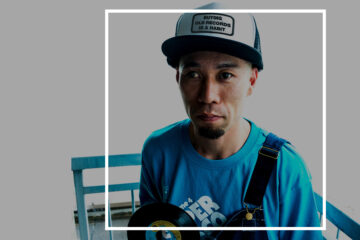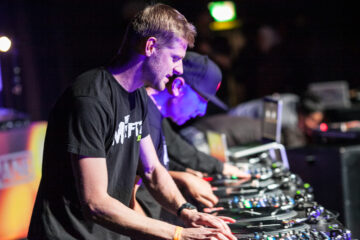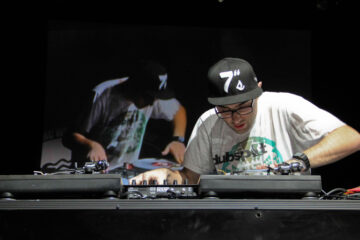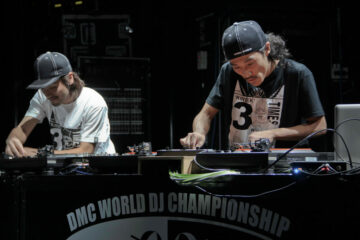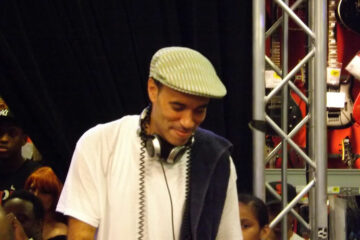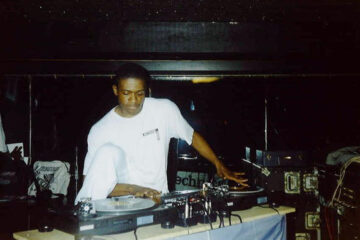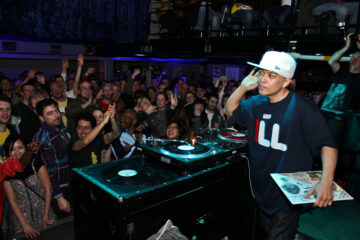This year the DMC World Championships turns 30. For that reason we talked to some of the winners of the last 3 decades about the history of DJing and their personal point-of-view on spinning the wheel of turns. So during the next weeks we like to introduce you to some of them. This time we talked to DJ Switch – World Champion 2008 and the youngest winner of »Battle For Supremacy (UK)« in the age of 17.
When did you start with turntablism?
DJ Switch: When I was young I started noticing scratch DJs appearing in pop music videos – with bands like Limp Bizkit and Linkin Park. And there were also tracks which featured scratching quite heavily, like Mark B & Blade’s »Ya Don’t See The Signs«, and it just sounded amazing / weird. My dad then gave me a copy of the video for the 2001 DMC UK final. I watched that, and just said »I have to work out how to do that«.
Are you still active? Do you make a living off of it?
DJ Switch: Yes, it’s currently my 9 to 5! I’ve been DJing full time for about 3 years now, and my first paid gig was in 2006. I went to university to study design & engineering, but part way through the course I won my first world title, and I just got busier & busier after that. It was a bit of a no-brainer to switch full time to doing something, which you can very legitimately claim to be the best in the world at!
What kept you excited all those years?
DJ Switch: From day one it was all about doing the DJ battles – I didn’t think very much about the more typical aspects of DJing, I wanted to learn how to do this crazy stuff. And it still is one of my favourite things ever to put together & perform a great routine, taking part of a record & remixing it live into something completely new. But doing more live shows at clubs, festivals, etc. you get a massive buzz from people, when they really react to a trick you do, a tune you drop or even just creating a great vibe over the course of an hour. I’m constantly working on new stuff for my club sets.
What’s your most favorite routine?
DJ Switch: That’s a wonderful & very tricky question! I suppose my most popular would be my James Brown routine. Probably my most technical I’ve ever put together is my DJ Shadow »Organ Donor« juggle. It’s tricky because every routine takes an entirely different route to each other, because they’re responses to the material you start with. But I suppose my favourite routine at the moment would be my Run DMC »Walk This Way« routine. It’s one of those tunes that no-one’s tried to flip, and I’m very proud of getting all the variety in that one routine.
When developing a new routine, where do you start?
DJ Switch: Most of my routines have come from listening to a track (whether well-known or not) and hearing a certain break – a section which has an interesting arrangement of beats & sounds, and that then starts conjuring ideas for patterns, how you can re-sequence those particular beats into new patterns. After getting the main idea down, it could then take a couple of hours to structure the whole routine, getting an intro & outro from the track itself, or working out the best way to transition between different tempos.
What’s your basic philosophy on turntablism?» It’s now in a world where, in terms of technicality, most things have been done.«
Dj Switch
DJ Switch: I like DJ Craze’s philosophy of being a good all-rounder, and that’s something I’ve tried to take to heart. Beat juggling I would say is my speciality, but in the battles I would always do even amounts of scratching, body tricks, disses. And making sure you have a personality which comes across, and that in particular is something a lot of people miss out on. In general, my philosophy is to try and flip material that other people have created, and show off stuff that’s interesting & entertaining. It’s live remixing, much of which either can’t be done any other way or would be hideously complicated to create the effect any other way – it’s unique.
How do you prepare for battles? And how do you feel when doing a battle?
DJ Switch: My prep for all the battles consisted of doing spreadsheets – planning out my rounds, timing them, listing my opponents (watching their material where possible), getting disses for them & working out which of my rounds would be best to deploy against them. It was very methodical. I didn’t really do much in the way of physical exercises, just practising my routines a lot so I knew them inside out.
How I feel when actually doing a battle? Erm I’m normally quite blank, just sort of running through the routine & being in the moment. If there’s an error in my set I’m good at thinking while I’m performing »Ok, how do I cope with this?« Whenever I diss people I’m able to breathe those moments a lot more.
Do you remember your first DJ battle?
DJ Switch: My first battle was in a town called Sandwell, and was much more of a mix battle – I could do very simple scratches at the time, which helped me win I think. Most of the DJs were mixing grime, garage and bits of hip hop. I think I mainly spun drum & bass. I still have the trophy, which has faded a little in colour, and has a picture of a guy in an Elvis suit doing karaoke on it. Also still have the tapes my parents filmed – haven’t watched those back in a while!
Do you remember your DMC battle for Supremacy?
DJ Switch: Yeah, I remember all of them, 2010 especially ’cause that was definitely my best year in the competition. The first time I won the worlds though [in 2008] I had a tough semi-final against Japan’s DJ Bunta. I remember I got through that round by 1 point, but I hadn’t used my best round yet (my James Brown juggle) so I had a little moment to myself just thinking »Wow, I’m actually in with a chance of winning this!«
How has turntablism evolved over the years?
DJ Switch: It’s changed dramatically, and gone through I think very natural phases – you started with the body tricks / ‘showing off’ era where everyone was very much experimenting, trying to create new tricks. It’s now in a world where, in terms of technicality, most things have been done. Which is great because it’s pushed everything into more musical realms, and trying to actually create new music. This is strongly reflected in the battle scene where the introduction of digital has meant every DJ now has full control over what sounds they can choose, and they have to become composers, unbound by the limits of vinyl.
Digital or vinyl? What’s your weapon of choice and why?
DJ Switch: I do most of my normal DJ shows with digital (using Serato to control digital vinyl timecodes). Rocking parties and such is very comfortable when you have those extra controls at your disposal – cue points, loops, effects, creating your own edits and even playing your own dubplates without having to press them or anything like that. That said I do occasionally do vinyl-only shows, and they are so enjoyable as a result – playing stuff I wouldn’t normally on a headline show & doing my old vinyl routines. I do treasure my vinyl collection (small though it may be) and sharing it with people.
Your top 3 turntablism records?
DJ Switch: The Avalanches – Frontier Psychiatrist; 2Tall (aka Om Unit) – Shifting Tides; DJ Yoda – Hot To Cut & Paste Vol. 1



